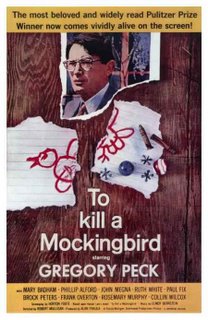To Kill a Mockingbird
For the past year or so, I have been writing film and TV reviews at DVDFanatic.com. Here are synopsis' and links to those reviews.

It is one of the great humanitarian works of the cinema. It is one of the great humanitarian works of any artistic medium. It is, quite simply, a masterpiece of not only technical merit, but also staggering moral breadth. When one speaks of the power of art to change a life, they are talking about films like To Kill a Mockingbird.
Based on the beloved novel (her only) by Harper Lee, To Kill a Mockingbird, set in the deep South during the Great Depression, is a story of two siblings, Jem (Phillip Alford) and Scout (Mary Badham), and the year in which they lose their innocence. Their single father, Atticus (Gregory Peck), is a lawyer embroiled in a case to save a black man (actor Brock Peters, who just passed away) wrongfully accused of raping a young white woman, while simultaneously trying to shield his children from the darker side of humankind that the trial represents.
The film is an odyssey through the inferno of prejudice, injustice and blind hatred--profoundly adult themes seen and emotionally ingested by children. Try as Atticus might to hold back the sea of evil and ignorance, the children' s curiosity and stubborn willfulness expose them to the dark underbelly of humanity and ushers them on their way toward adulthood. Still, amid the putrid belches of the world around them, the children have an example, in their father, of all that is right and good and pure in humankind.
For Atticus, a deeply principled man who has raised his children on the compass of a moral education to be respectful and empathetic, ideals such as justice, respect and love are not words to be bandied about in the courtroom or the living room. They are living, breathing, organic virtues that are lived out in demonstration and daily manifestation. Watching the film as a child, I saw Peck's Atticus as the ultimate father and perhaps even the ultimate man.
I still do.
Where other tales about the loss of innocence fade with time, the universal message of compassion and respect in To Kill a Mockingbird will never age, nor will its lyrical, poetic beauty. It is and will always remain a classic. Like the cigar-box treasures in the film that the children find, To Kill a Mockingbird is a treasure worth preserving and cherishing.
To read the full review, click here.

It is one of the great humanitarian works of the cinema. It is one of the great humanitarian works of any artistic medium. It is, quite simply, a masterpiece of not only technical merit, but also staggering moral breadth. When one speaks of the power of art to change a life, they are talking about films like To Kill a Mockingbird.
Based on the beloved novel (her only) by Harper Lee, To Kill a Mockingbird, set in the deep South during the Great Depression, is a story of two siblings, Jem (Phillip Alford) and Scout (Mary Badham), and the year in which they lose their innocence. Their single father, Atticus (Gregory Peck), is a lawyer embroiled in a case to save a black man (actor Brock Peters, who just passed away) wrongfully accused of raping a young white woman, while simultaneously trying to shield his children from the darker side of humankind that the trial represents.
The film is an odyssey through the inferno of prejudice, injustice and blind hatred--profoundly adult themes seen and emotionally ingested by children. Try as Atticus might to hold back the sea of evil and ignorance, the children' s curiosity and stubborn willfulness expose them to the dark underbelly of humanity and ushers them on their way toward adulthood. Still, amid the putrid belches of the world around them, the children have an example, in their father, of all that is right and good and pure in humankind.
For Atticus, a deeply principled man who has raised his children on the compass of a moral education to be respectful and empathetic, ideals such as justice, respect and love are not words to be bandied about in the courtroom or the living room. They are living, breathing, organic virtues that are lived out in demonstration and daily manifestation. Watching the film as a child, I saw Peck's Atticus as the ultimate father and perhaps even the ultimate man.
I still do.
Where other tales about the loss of innocence fade with time, the universal message of compassion and respect in To Kill a Mockingbird will never age, nor will its lyrical, poetic beauty. It is and will always remain a classic. Like the cigar-box treasures in the film that the children find, To Kill a Mockingbird is a treasure worth preserving and cherishing.
To read the full review, click here.


0 Comments:
Post a Comment
<< Home